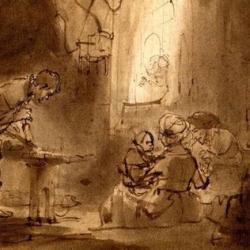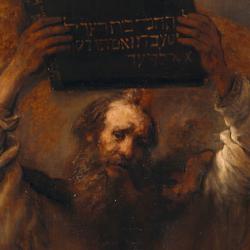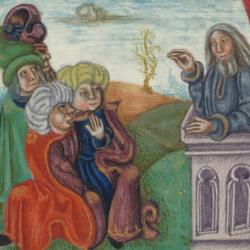Exodus and Acts seem to offer different accounts of Moses’ killing of the Egyptian.
In Exodus, there’s an emphasis on the secrecy of the act. Moses sees an Egyptian beating a Hebrew slave, looks around to see if anyone is watching, then kills the Egyptian and buries him in the sand. The next day, he has an encounter with two Hebrews in which it becomes clear that the secret is out. When Pharaoh learns of it, he tries to kill Moses, and Moses flees (Exodus 2:11-15).
As Stephen tells the story, Moses acts justly. He defended the Hebrew slave, and took “vengeance for the oppressed” (Acts 7:24), certainly a good thing. Stephen adds that Moses expected his deliverance of a single Hebrew slave to be the beginning of a general liberation: “He supposed that his brethren understood that God was granting them deliverance through him” (v. 25). Fault is laid on the Hebrews for not recognizing the deliverer whom Yahweh had raised up, which became evident when Moses tried to reconcile the fighting Hebrews (vv. 26-29). Stephen sees the rejection of Moses as typical of Jewish resistance to God. Just as they refused Moses as ruler and judge, so they have done with Jesus.
The Exodus story itself has some oddities. How did Moses expect to keep the incident a secret? After all, he had delivered a Hebrew slave from a beating: Wouldn’t the slave go around telling the story? When we look at the Exodus story in the light of Acts 7, we have to ask how Moses expected that the Israelites would know he had come to deliver them, since he tried to keep the initial act of deliverance hidden.
The puzzles resemble to some degree the puzzles that surround discussions of the “Messianic secret” in the gospels. Especially in Mark, Jesus heals, exorcises, performs miracles, but then instructs the healed and exorcised to keep quiet. Many explanations have been offered, but the most plausible highlight the issue of timing and the question of the nature of Messianic deliverance. Jesus’ “hour has not yet come,” and until it does, he wants His identity to be veiled. There’s political strategy here: He doesn’t want His movement to come to the attention of hostile authorities until the moment is ripe.
More, His identity needs to be veiled because the concept of “Messianic” is encrusted with all sorts of distorted hopes. In Mark, Jesus finally reveals Himself as Son of God on the cross. When the Jews finally see what sort of deliverance Jesus is bringing, they aren’t interested. By traditional standards, death on a cross is as un-Messianic as it comes. For Mark, it’s only on the cross that the Messianic can be seen clearly. Jesus keeps the news of deliverance in reserve until it’s clear what sort of deliverance He’s bringing, and then He reveals the shape of the Messianic to a Roman centurion.
Perhaps there is something similar in the story of Moses. Moses’ defense of the slave is the beginning of the liberation of Israel, but it’s a hidden deliverance. Like Jesus later, Moses intends to keep the coming deliverance under the radar until the right moment. If the story spread quietly and the Hebrews rallied to Moses, that would be one thing. Perhaps it would be the beginning of a general slave rebellion – just what Pharaoh feared when he saw the Hebrews multiplying and filling the land. As it happened, the story spread and the Hebrews resented Moses. When Moses saw that the Hebrews themselves were siding against him, effectively siding with the Egyptian oppressors rather than with the Hebrew deliverer, he knew that deliverance was not near. He fled from Egypt, from his own people, and went into Midian, among Gentiles. His first act in Midian was to defend Reuel’s daughters from thugs and to supply them with water. It’s a preview of what he will later do for Israel, and a sign of what he could have done for Israel, had they recognized him as deliverer.
When he comes back to Egypt forty years later, nothing is hidden. He marches into Pharaoh’s palace and demands that he let the people go. Yahweh Himself comes to the defense of His oppressed people, striking the oppressors with a series of devastating plagues. What had been whispered is now proclaimed on the housetops. Again it foreshadows the sequence of events in the New Testament: Jesus works in secret, but when the Spirit falls, when Jesus “comes again” in the ministry of the apostles, nothing is hidden, and there is an open confrontation between the apostles and their enemies.
(Thanks for David Richmon and Marc Allen for stimulating discussions of these passages.)














